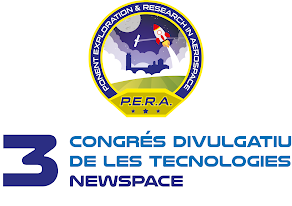Con las becas obtenidas por el Liquid Galaxy LAB (de los Laboratoris TIC del Parc Científic de Lleida, sede de P.E.R.A.) vamos a poder realizar diversos proyectos de visualización relacionados con el espacio.
Los proyectos becados por Google han sido:
SatNOGS Network data visualizer for Liquid Galaxy
Paula Marín Banqué

Mithil Ghinaiya
MS in Computer Science
ISAE Supaero & INSA Toulouse
Toulouse, France
The aim of this project is to build an application for Liquid Galaxy that allows us to observe satellite data next to the representation of the satellite. The data visualized will be obtained mainly from the SatNOGS network and will be displayed next to the satellite while it moves around the globe.
The user will be able to visualize this data and have an approach of open-source satellite data and it would help the mainstream public to understand the kind of information that can be collected by a satellite.
Orbit Satellite Visualizer for Liquid Galaxy

Albert Morea Font
The aim of this project is to build an application for Liquid Galaxy that allows us to observe satellite data next to the representation of the satellite. The data visualized will be obtained mainly from the SatNOGS network and will be displayed next to the satellite while it moves around the globe.
The user will be able to visualize this data and have an approach of open-source satellite data and it would help the mainstream public to understand the kind of information that can be collected by a satellite.
Orbit Satellite Visualizer for Liquid Galaxy

Albert Morea Font
Universitat Politècnica de Catalunya
Barcelona, Spain
The aim of this project is to build an application for Liquid Galaxy that allows us to observe several space-related topics. For example, the user would be able to see what is an orbit, the different heights and types (LEO, MEO, HEO…), which kind of satellites are in each orbit and why, the different speeds in function of the height, etc. Also, another topic that I want to work on is to plot the flight profile of a rocket until it reaches orbit. This project can benefit in two different aspects, such as:
On the one hand, it can be used by all professional bodies involved in space planification to visualize, design and redesign the available airspace for each situation.
Liquid Galaxy Stellarium
The aim of this project is to build an application for Liquid Galaxy that allows us to observe several space-related topics. For example, the user would be able to see what is an orbit, the different heights and types (LEO, MEO, HEO…), which kind of satellites are in each orbit and why, the different speeds in function of the height, etc. Also, another topic that I want to work on is to plot the flight profile of a rocket until it reaches orbit. This project can benefit in two different aspects, such as:
On the one hand, it can be used by all professional bodies involved in space planification to visualize, design and redesign the available airspace for each situation.
Liquid Galaxy Stellarium

Mithil Ghinaiya
MS in Computer Science
North Carolina State University (Raleigh, USA)
Stellarium is a free open source planetarium for your computer. It shows a realistic sky in 3D, just like what you see with the naked eye, binoculars or a telescope. Mithil's project will update the port to a Liquid Galaxy environment (cluster of pcs running Linux and screens) and make Stellarium sync across.
Liquid Galaxy Image Satellite Visualizer

Octávio Henrique Müller Barrio
Stellarium is a free open source planetarium for your computer. It shows a realistic sky in 3D, just like what you see with the naked eye, binoculars or a telescope. Mithil's project will update the port to a Liquid Galaxy environment (cluster of pcs running Linux and screens) and make Stellarium sync across.
Liquid Galaxy Image Satellite Visualizer

Octávio Henrique Müller Barrio
FACENS, Sorocaba, Brazil
The idea of the project is the real time visualization of satellite images that would be attached as layers of google earth, besides being able to have diverse information of the earth being graphically generated as storms, fires, masses of heat and water vapor, a synchronous earth visualization will allow for more complex interactions.
The images will be coming in real time from free APIs of Copernicus, ESA and NASA.

The idea of the project is the real time visualization of satellite images that would be attached as layers of google earth, besides being able to have diverse information of the earth being graphically generated as storms, fires, masses of heat and water vapor, a synchronous earth visualization will allow for more complex interactions.
The images will be coming in real time from free APIs of Copernicus, ESA and NASA.









.jpg)


